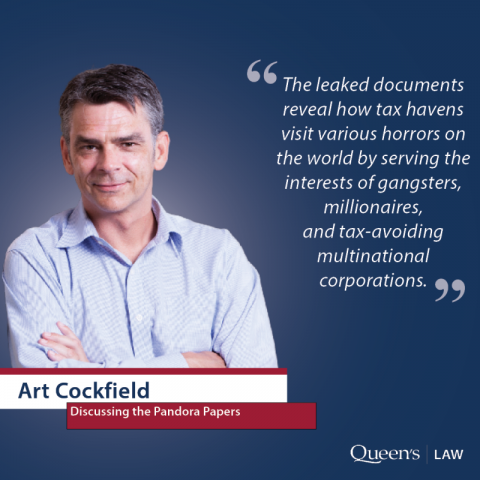
Associate Dean Art Cockfield, a tax law expert and policy consultant, shares his insight on the latest massive data leak that exposes how some of the rich and famous avoid paying taxes and what that means for ordinary taxpayers.
The most recent tax haven data leak, the Pandora Papers, is aptly named. According to an Ancient Greek myth, Pandora was a mortal human who opened Pandora’s box (it was actually a jar) to inadvertently release sickness, death, and other calamities into the world. In the case of the Pandora Papers, roughly 12 million pages were leaked by law firms based in tax havens such as Singapore and the British Virgin Islands.
The leaked documents reveal how tax havens visit various horrors on the world by serving the interests of gangsters, millionaires, and tax-avoiding multinational corporations. Like the Panama Papers from 2016, the Pandora Papers also reinforces the idea that the offshore world is rigged in favour of the wealthy and powerful, and against the interests of average citizens.
With respect to the releasing the evils of crime, the Pandora Papers shows how tax haven-based law firms and businesses help crooks engage in offshore tax evasion and international money laundering (roughly $2.5 trillion in illegal earnings is laundered around the world each year). The crooked businesses set up offshore corporations and other business entities to mask the illicit proceeds from crimes such as illegal drug sales. While the Canadian government routinely convicts small-time tax cheats, our government has hardly ever convicted a wealthy financial crook for crimes such as offshore tax evasion.
Tax havens also allow millionaires to engage in legal tax planning to reduce bills in ways that cannot be accessed by ordinary citizens. The Pandora Papers shows how tax havens help this wealthy group, including Canadians such as Jacques Villeneuve and Elvis Stojko, legally avoid paying taxes by, for instance, parking monies in offshore trusts based in tax havens.
Finally, the Pandora Papers once again exposes the lavish tax breaks available to giant corporations. The problem is that these legal tax avoidance plans, which are widely deployed by the Canadian business community, reduce tax revenues and make it harder for the government to fund public goods. In recent high profile cases involving taxpayers like Cameco and Loblaws, the government unsuccessfully challenged tax planning that appeared to be aggressive and at least outside of the spirit of the tax laws. Legislative reform may be needed to resolve the issue.
A bright spot on the horizon: In recent federal budgets, the Liberal government has committed over a billion dollars to help the Canada Revenue Agency enforce tax laws.
Associate Dean Art Cockfield is a member of the Offshore Compliance Advisory Committee, a federal government committee formed to evaluate Canada’s ties to the offshore world. With Professor Christian Leuprecht of Queen’s and RMC Political Science, he is working on the project, “Invisible Underworld: Inhibiting Global Financial Crime,” funded by the Social Science and Humanities Research Council.